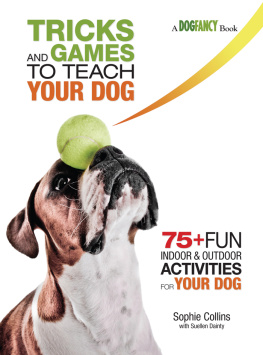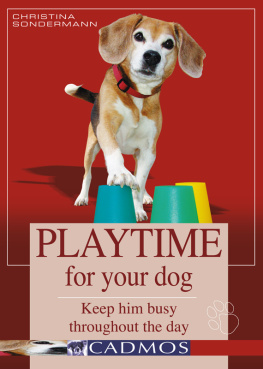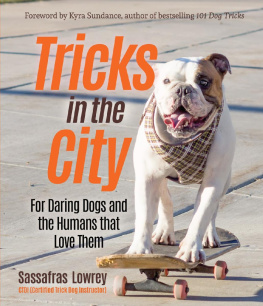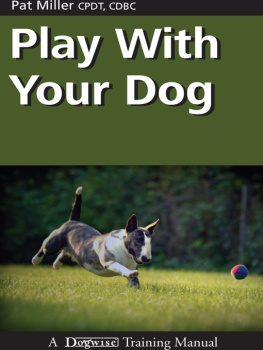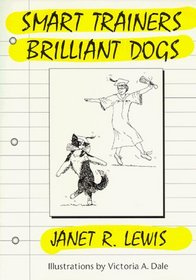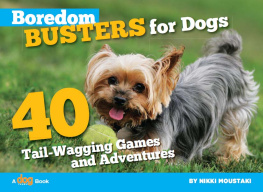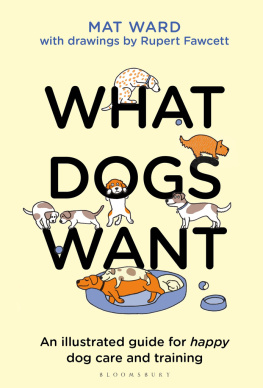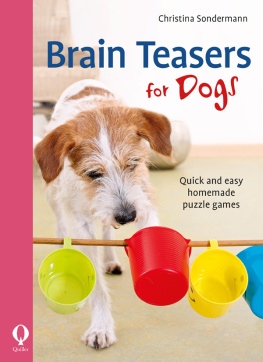FUN & GAMES
FOR A
SMARTER DOG
Sophie Collins

INTRODUCTION

When it comes to teaching your dog, one thing is certain: you wont be short of advice. Whether you have a new puppy, have just adopted a rescue dog, or have decided that the affable but not-so-obedient family pet that youve had for some years needs a behavioral tune-up, there are a lot of dog-training experts around. Many will simply tell you, unasked, on the street or at the park, that youre doing something wrong, while others will offer alternatives; some will insist that your dog wont respect you unless you dominate him (in particular, ignore these ones), others will tell you about the perfect pet professional who turned their problem pet around. And, of course, this book, too, is one of many, plenty of which offer conflicting advice. All this can create a lot of confusion. So how can you teach your dog in a way that will build your relationship, make sure you have fun together, and incorporate lessons that will help him to get along in our human-managed society? And can it be done in a way that will keepor getyou both fit, too, and generally make you both happy?
Its a lot to ask, but you do have one true expert on hand, and thats your dog himself. Among all the information people will offer you, something is often overlookedthat we can learn as much, or more, from dogs as they can learn from us. After all, they live in a world that is made for people, following peoples rules. Generally, they manage this successfully; far more so than most people would if the situation were reversed and they were transplanted into a world of dogs.
Domestic dogs are, as a species, extraordinary adaptable and tolerant. They are highly social animals that collect huge amounts of information from us, often learning more from our body language than from what we tell them verbally (more on that later). Their senses are more developed than ours. With noses around a thousand times more sensitive, they naturally rely on smell for a lot of their daily news and make up the balance largely with minute observation of whats going on around them. True, they cant talk, but they both watch and listen intently. Theyre also remarkably forgiving. Even after youve messed up the job of teaching them something simple, confusing your signals, sending conflicting body language, and raising your voice instead of concentrating on what youre saying, your dog will usually still be hanging in there, looking to you for amended instructions and remaining willing to try to understand, however confusing youre being.
These are all good reasons for you to take the trouble to learn to teach your dog properly and patiently, with a consciousness of what usually works and what may not, and with an awareness that your dog is a dog, not a small and sympathetic person in a furry coat. The chapters that follow take account of all these factors.
Working with your dog should continue throughout his life as part of your owner/pet relationship. At some point, you will probably feel that he is trainedwhen he knows whats considered acceptable, both at home and out and about, and sticks to the rules most of the time. But if you stop there, as many people do, youll be missing a trick (sometimes literally). Because a mix of training and playing is fun, and a short sessionten minutes is enoughover and above the walking and playtime that dog owners build into every day will bring rewards out of proportion to how long it takes. Mix things you want him to know with things he loves doing, keep it fresh by interweaving elements of routine with challenges and surprises, and youll have a pet who stays young for his years and wholl always welcome the chance to spend more time with you.
And what about the smarter part of the equation? Can you really train your dog to be smarter? It may not be the case that you can actually raise his canine IQ, but with short, regular, consistent playing-and-training sessions, you can build on his strengths, get rid of most day-to-day difficulties, broaden his horizons, and be sure hes an all-around good canine citizen with plenty of personality and a healthy respect for the rules. All of which adds up to a smart dog.
PLAYING SAFE
There are almost endless possibilities when it comes to games and activities you can play with your dog. Before you start, however, it is essential that you make sure you will be playing safe.
AGE AND FITNESS
Almost every dog can play some games, learn some tricks, and enjoy doing both. If youre teaching a particularly young or old dog, however, be careful that you dont push him too far. Dogs that are still at the growing and developing stage (under a year and up to two years in some breeds) shouldnt do any jumping and shouldnt be allowed to overtire themselves, so use your common sense if your dog seems to be wearing himself outa young dog wont always know when hes had enough. At the other end of the age scale, dont push an elderly dog beyond his comfort zone; the stamina of a ten-year-old probably wont be as high as that of a dog in his prime of fitness, and older or arthritic pets shouldnt be overexcited so much that they hurt themselves.
Jumping, standing or walking on their back legs, or turning awkwardly can all cause injuries that may recur or lead to long-term strain or weakness in young, old, overweight, or unfit dogs, so use your common sense when judging whats suitable for your particular pet. Additionally, brachycephalic breeds (those with flat faces, such as Bulldogs) should not be allowed to overexert themselves. In the following chapters, weve included a note in cases where the occasional trick or game isnt the best choice for a puppy, an older dog, or a less fit dog, plus suggestions on how to modify it, if necessary.
KNOW YOUR DOG
If youre playing with your own dog, you are probably the person who knows best what he will enjoy, and you can play to his strengths. If youre with a dog that isnt yours, check his preferences with his owner and be careful and observant during play. You need to know about a dogs behavioral tendencies before you start. For example, if a dog tends to get be guarded about favorite toys, its best to get him familiar with the idea of leaving (see ) before you introduce a toy-based game; dogs who tend to engage in one-upmanship need to be introduced carefully and in a controlled way to competitive games, such as tug. If your pet isnt enthused by a particular activity, dont keep pushing it at himinstead, try a different one. There are plenty of choices, and hell learn much more easily if you focus on his strengths, whether he turns out to be an athlete, a thinker, or even a clown who loves to play to an audience.


